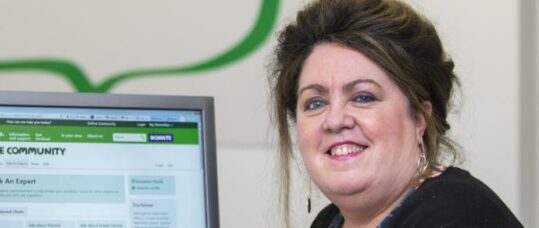Ellen McPake: Combating fake cancer news online

As more patients turn online for their health information, Macmillan has created a new role to make sure that patients can avoid the myths of cancer and get to the facts. Ellen McPake, a cancer nurse with over 35 years’ experience, who has been working for Macmillan for the past 15 years is their very first ‘digi-nurse’
Where did you work before accepting the role as digital nurse?
Before this I worked on the MacMillan cancer support line. People can use it to phone in to speak to one of the nurses or welfare or financial guides. I was one of the nurses on the helpline for five and a half years. Previous to that I worked in Glasgow as a breast care nurse in for 15 years and a cancer nurse before that.
What do you think when this new role was announced?
I was really excited because as a nurse on the support line, I did a lot of online work where I answered a lot of questions that people sent through social media or our big online community.
We’ve got a section on our website called ‘Ask a nurse’, so online questions was always a part of my role but on an ad hoc basis.
Related Article: Mythbuster: ‘I don’t need a smear test – I’ve had my HPV jab’
This role was created because there was seen to be an increased need for a nurse to work alongside social media.
This is a new way to reach as many people effected by cancer as possible.
Will you be able to answer patient questions directly through social media?
Yes. Nowadays some people prefer not to call but to type their questions for us on their smart phones. It’s what they’re more comfortable with.
At the moment we have a big presence on Facebook. On that platform in October we did online Q&As around breast cancer to match the awareness month. We’re going to continue that with different cancers each month.
How have you seen the trend grow of patients looking for support online?
We get phone calls from people who have read things online such as cancer ‘can be cured by drinking sodium bicarbonate’, or vitamin C or having coffee enemas. Some of these ‘cures’ can be dangerous to the patient’s health and most cost lots and lots of money. They phone us for advice after reading these things and we have to de-myth it and point them to evidence-based research instead.
I had a call once where a couple had been to a clinic and paid lots of money to be treated with vitamin C, which they were told could cure cancer. The trips abroad to the clinic cost them their life savings and provided no benefit at all. The man was so upset. He wished he’d used whatever savings they had for a better quality of life. And that decision is with them forever.
| Common online cancer myths |
|---|
|
The internet is a great resource for information but it has to be the right information. Patients can easily start on a credible site but then click a link and end up somewhere else.
Related Article: Smoking rates fall most significantly in the North of England
As professionals, we want to make sure that we can support as many people as we can and the internet is great for that.
At the time of diagnosis, which is a time of shock for many, people are given a lot of information all at once. Patients and their families are coming away from appointments thinking ‘I need to do my own research’. And that’s ok! But we need to help them to reach the right resources.
How do you handle people who call who just think they have cancer?
We get that a lot on the ‘Ask a nurse’ section. People will say things like ‘I’ve got a pain in breast that’s like cancer’ or ‘My symptoms look very similar to lung cancer.’
As nurses we would always suggest that instead of diagnosing themselves, they should see a doctor because there are lots of other things that could cause these symptoms but we do get a lot of anxious patients.
Will this role come into general practice?
Related Article: Boost your CPD with the redesigned Nursing in Practice 365 platform
It’s an exciting and different role but it could be difficult to fit into general practice. Signposting patients is definitely helpful though. For example, a practice nurse could direct a patient with cancer who has questions to our Macmillan nurses instead of having to refer them back to their hospital nurse.
Do all nurses need to work to be mythbusters today?
I suppose that role has always been there. People read things online or they hear things by word of mouth and myths can go around that way. These things are more out there than they used to be because of social media and once something becomes a trend it can kind of grow arms and legs. It’s important to help people differentiate the correct information. Nurses are aware of this but it’s more important to be conscious of it now.

See how our symptom tool can help you make better sense of patient presentations
Click here to search a symptom


As more patients turn online for their health information, Macmillan has created a new role to make sure that patients can avoid the myths of cancer and get to the facts. Ellen McPake, a cancer nurse with over 35 years’ experience, who has been working for MacMillian for the past 15 years is their very first ‘digi-nurse’



